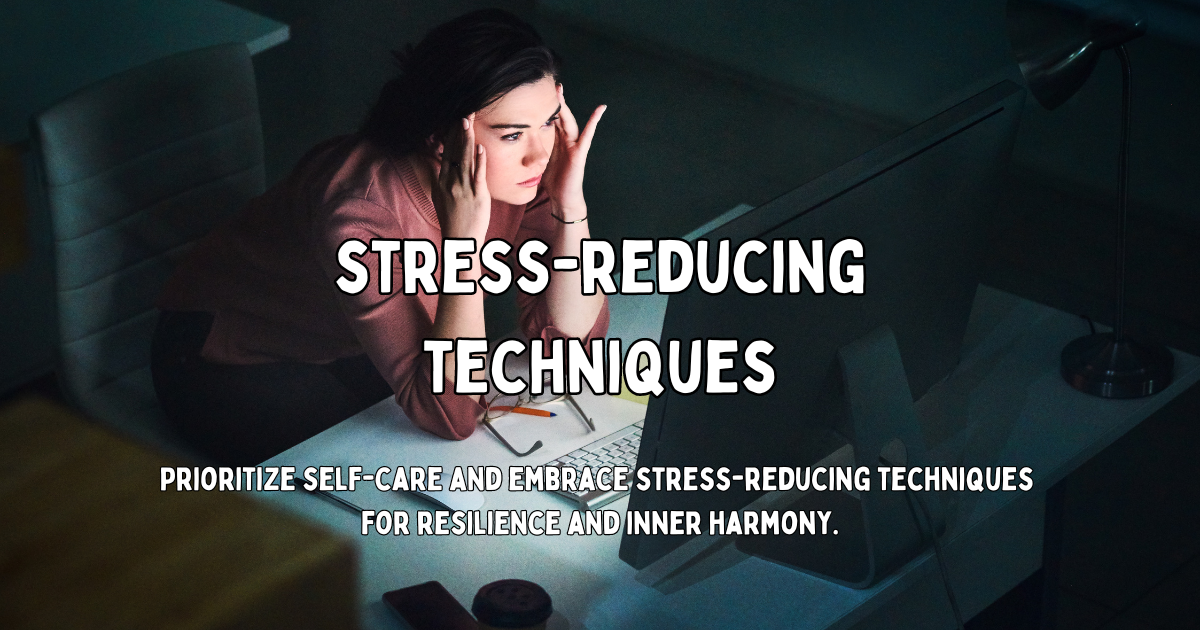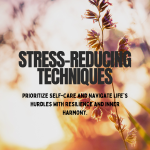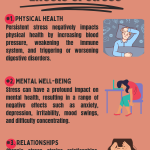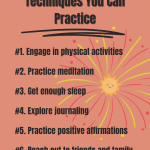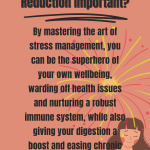Stress-Reducing Techniques to Restore Balance in Your Life
Last Updated on 9 months by Iva Ursano
Stress is an inevitable companion that affects your mind and body. It’s all too familiar—the racing heart, the quickened breath, and the tension that grips your muscles when stress reaches its peak. And when stress becomes overwhelming, it can profoundly impact your overall well-being. That’s why it’s so important to equip yourself with reliable stress-reducing techniques that allow you to find solace and restore balance in your life.

Although managing stress isn’t a one-size-fits-all approach, having a variety of stress management techniques is immensely valuable. Think of it as building your personalized stress relief toolkit. By exploring different techniques, you can find what resonates with you and restore calmness in your life. For instance, you can explore boosting your confidence and finding your purpose for better self-understanding.
Why Is Stress Reduction Important?
Did you know that by effectively managing stress, you can protect your well-being and enjoy a healthier life? It’s incredible how reducing stress can help prevent high blood pressure, strengthen your immune system, improve digestion, and alleviate chronic pain.

Not only that but taking steps to manage stress also safeguards your mental health. With this, you can enjoy a sense of calm and enjoy better focus, reduced anxiety, and restful sleep. By prioritizing stress reduction, you can cultivate a positive and balanced state of mind, empowering yourself to lead a fulfilling and vibrant life.
Lastly, it’s worth noting that chronic stress can cause long-term health issues, but you can prevent them by reducing stress. Now, let’s explore some of the best stress-reducing techniques you can use to manage your stress effectively.
Stress-Reducing Techniques You Can Practice
1. Engage in physical activities

Did you know that physical activities can hack your brain into thinking that you’re actually happy? Exercising induces a useful hormone called endorphins and it can alleviate pain, reduce stress levels, and improve your overall mood.
Engaging in locomotive movements can redirect your attention to your body’s movement, helping you refocus your attention. You can incorporate simple activities such as taking a walk, cleaning your car, and playing with your dog. As long as it gets you moving, you can reap the benefits of an active lifestyle.
2. Practice meditation

Meditation helps you focus your mind and turn down the volume of jumbled thoughts that may be infiltrating your mind. It provides you with a great sense of calm, relief, and peace to balance your emotional well-being.
What makes meditation great is that it has different forms. You can try guided meditation, mental visualization, guided imagery, mindfulness, and a whole lot more. Plus, meditation is easy to practice wherever you are—be it on the bus, at the park, or at a doctor’s office, you can take a moment to do it.
3. Get enough sleep

Getting enough sleep plays a crucial role in stress management. By adopting a regular sleep routine, you can enjoy a sense of calm, better concentration, a stable mood, and sound decision-making. Moreover, prioritizing quality sleep boosts your problem-solving skills and helps you navigate stress with greater confidence.
Besides having seven to nine hours of sleep each night, your sleeping conditions can also affect your mood. To prevent sleep troubles, it’s vital to have a quiet and relaxing bedtime routine. For instance, make sure that your bedroom is dark and quiet and place your gadgets away from the bed.
4. Explore journaling

As your stress levels go high, writing down your thoughts and feelings can be a great release for pent-up emotions. When journaling, you don’t need to think about what to write—simply let it flow out of your system and write anything that feels natural at the moment.
By putting your thoughts onto paper, you open doors to gain valuable insights, discover coping strategies, and cultivate a more balanced and resilient mindset. It allows for emotional expression, promotes self-awareness, aids in problem-solving, reduces stress levels, and cultivates gratitude and positivity.
5. Practice positive affirmations

The way you address yourself matters because it implies how much you love, value, and respect yourself. Harsh self-criticism and self-doubt aren’t good for you because they will only lower your self-esteem and increase your stress levels.
That’s why it’s crucial to practice positive self affirmations and talk to yourself in a more compassionate, loving way. The more you do it, the more you believe it, and the sooner you can have a kinder and less stressful inner dialogue.
6. Reach out to friends and family

Social contact acts as a potent stress reliever, providing not only distractions but also the vital support and guidance required to navigate life’s ups and downs. So, whether it’s simply taking a coffee break together or reaching out to a relative online, please make a conscious effort to connect with others.
These meaningful interactions provide solace, a fresh perspective, and a temporary escape from overwhelming thoughts. Importantly, they also serve as a source of strength, helping you endure and overcome the challenges that come your way.
What’s Your Favorite Stress-Reducing Technique?
Integrating stress-reducing techniques into your daily routine lets you open the door to a multitude of benefits that positively influence every facet of your life. Whether it’s strengthening your physical and mental health, boosting your productivity at work, or fostering meaningful relationships, engaging in self-care practices can truly be transformative.
By actively incorporating stress-management strategies like exercise, meditation, cultivating social connections, and ensuring sufficient sleep, you create a pathway to lower stress levels, improved sleep quality, and an overall enhanced sense of well-being. So, prioritize embracing these practices and discover the equilibrium necessary to navigate life’s hurdles with increased resilience and inner harmony.
If you loved this post, make sure to check out other topics that may resonate with your journey:
